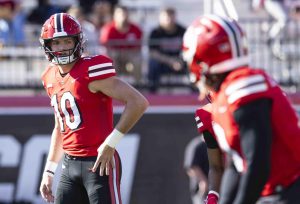Experts suggest ways to fight senioritis symptoms
December 3, 2010
Each year, seniors pass down a special academic illness to juniors. It’s called senioritis, and it occurs as students start reaching the homestretch of their college careers.
A primary symptom of senioritis is a high level of stress that lasts for a prolonged period while trying to reach the finish line, said Betsy Pierce, a staff psychologist at WKU’s Counseling and Testing Center.
While there are psychological symptoms, such as anxiety, burnout symptoms can be experienced physically, Pierce said.
Physical symptoms might include stress headaches, ulcers, high blood pressure and change in appetite, she said.
Psychology professor Rick Grieve said students often take their hardest classes senior year.
He said it’s difficult to push through to the end.
“As students get closer to graduation, they look more toward, ‘What do I do after graduation?’ rather than, ‘What I have to do to get to graduation,'” Grieve said.
Louisville senior Tremain Williams said he’s been putting off his homework this year more than in past years.
But the thought of graduating and getting just a few more classes out of the way has been motivating him to get the work done.
Hopkinsville senior Erin Austin said she has a small case of senioritis, but she keeps going to class to keep up her grades.
Lexington senior Tiffany Longstreet said she hasn’t caught any senioritis this year.
“I don’t have it, because I want to keep my GPA where it is, and I want to try and boost it before I leave,” she said.
Indianapolis senior Josclynn Brandon said anyone can experience burnout – not just seniors.
“I feel that a person of any classification just gets to the point where they are tired of doing stuff,” Brandon said.
Pierce said burnout is associated with fatigue that develops from the effort it has taken to get so far. It can also occur in juniors because they feel the goal is fairly far away, but they are too invested to quit.
Grieve and Pierce suggested some ways that can decrease burnouts, including making realistic goals, relaxing, exercising, eating well and sleeping well.
“Most professors are probably aware of student burnout and acknowledge they probably experienced it themselves,” Pierce said. “Professors know that it is not the best interests of preparing students for careers if they were to lessen requirements during the senior year.”
Grieve said senioritis is going to hurt some people who are at the extreme end of it, but the average person who experiences it can escape.
“More than likely, they will outgrow those feelings and do what they need to do to pass and graduate,” he said.












